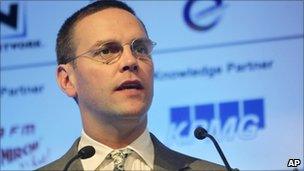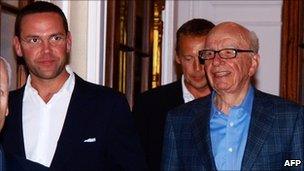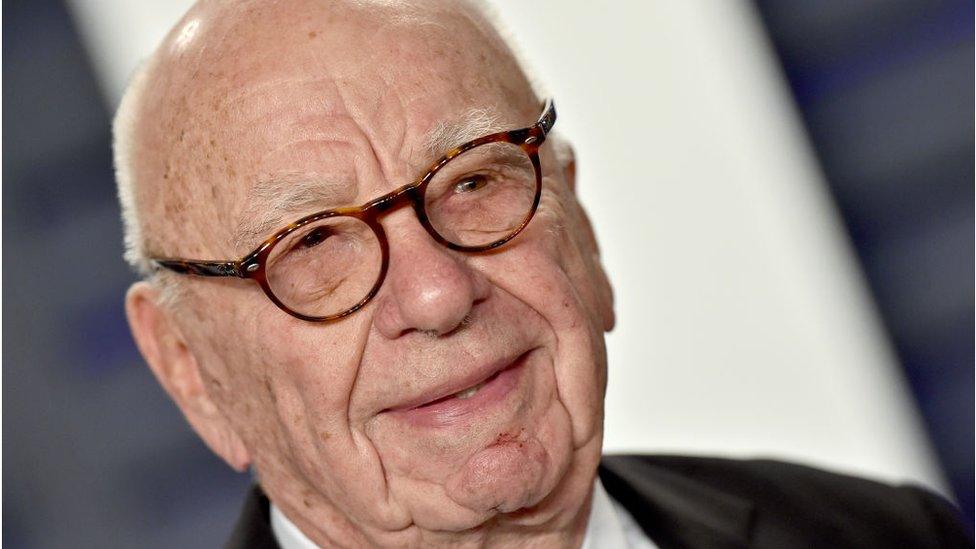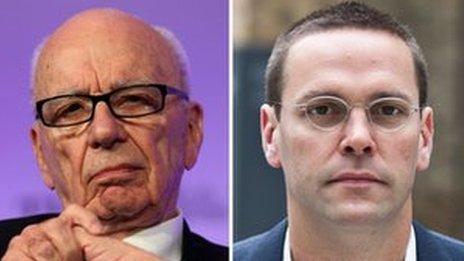Profile: James Murdoch
- Published

James Murdoch was promoted to News Corporation's third-highest post in March 2011
James Murdoch, 39, was once the clear front-runner to take charge at News Corporation, the world's biggest media organisation that was founded and is still controlled by his father Rupert, 81.
But the phone-hacking scandal that engulfed News Corp's newspaper operations in the UK has become a major impediment to Mr Murdoch Jr's elevation to the top job.
James's roles as head of the London-based newspaper arm and chairman of the satellite broadcaster BSkyB looked increasingly untenable as MPs, the police, regulators, and rival media groups delved deeper into what went on at the newspapers.
After months of allegations against the firm and its journalists, James announced he was stepping down as executive chairman of News International in February 2012.
He also resigned from his role as BSkyB chairman in April 2012, saying he did not want it to be undermined by "matters outside this company". He remains, however, a non-executive at BSkyB.
James is now based at News Corp's headquarters in New York, where his role as deputy chief operating officer, chairman and chief executive of international operations makes him effectively number three in the pecking order.
But he is unable to escape the hacking furore.
The UK media regulator Ofcom has now made damning criticisms of his conduct. His actions "repeatedly fell short" of those expected of a senior executive, Ofcom said.
Some shareholders in the US are taking legal action against News Corp, and there remains a chance that authorities there may launch investigations.
His troubles began when it became evident that phone hacking at News of the World tabloid was widespread, rather than the actions of a single "rogue reporter".
The paper was subsequently closed by the Murdochs in July 2011.
In the months that followed, MPs questioned how much James Murdoch knew about the extent of the wrongdoing, although he denied having seen emails that discussed widespread hacking.
He then faced a challenge over his position on the board of satellite broadcaster BSkyB, while the NoW's stablemate, the Sun, was accused of having a "culture of illegal payments" to public officials.
James Murdoch was called to give evidence to the Leveson Inquiry into press standards on 24 April, where he denied knowledge of the widespread phone hacking or of attempts to cover up the affair.
But questions about exactly what he knew and when refuse to go away.
Hip-hop label
Born in London in 1972, James is married to American Kathryn Hufschmid, with whom he has had three children.
He is the youngest of Rupert Murdoch's three adult children from his marriage to Anna Torv, the others being sister Elisabeth and brother Lachlan.
James has risen higher in the company than his older siblings, who went to work for their father but later left his employ.
However, it did not always seem likely that James would follow in his father's footsteps.
Schooled in New York, he studied film and history at Harvard University, but dropped out in the mid-1990s without completing his degree.
Gaining a reputation as the family rebel, he set up an independent hip-hop label, Rawkus Records, which launched the career of rapper-actor Mos Def and gave an airing to the then little-known Eminem.

After initially being seen as a rebel, James became an essential part of the Murdoch family brand
Rawkus was eventually bought by News Corporation.
In 1996, he was appointed chairman of another News Corporation music label, Australia-based Festival Records, also going on to take charge of the company's fledgling internet operations.
Four years later, James was appointed chairman and chief executive of News Corporation's Asian satellite service, Star Television.
He remained there for three years before taking up the top job at BSkyB in 2003 where, at the age of 30, he became the youngest ever boss of a FTSE-100 listed company.
The move prompted accusations of nepotism in some quarters, amid concerns that he was too inexperienced for the top position at BSkyB.
However, he was widely accepted to have done a good job during his tenure at Star.
Media lecture attack
He successfully expanded BSkyB to incorporate broadband internet and telephone services, while continuing to grow its TV subscriber base.
Even then, many felt James was being moulded into the role of heir to his father's media empire.
By the time he took control of News Corporation's operations in the UK, Europe and Asia, he had grown in stature.
He began to exhibit the combative qualities that established his father as one of the most powerful media moguls in the world.
In 2009, James delivered the keynote MacTaggart lecture at the Edinburgh Television Festival, during which he took aim at the UK establishment.
In his speech, 20 years after his father delivered the same keynote address, James said a "dominant" BBC threatened independent journalism in the UK.
Family affair
He also blamed the government for regulating the media "with relish".
Meanwhile, reports suggested his relationships with his elder siblings could, at times, be fractious. Elisabeth and Lachlan were said to be closer to each other than to James, and both appear to have done more to distance themselves from their billionaire father's media operations.
James, however, created his own space within the family business.
In March 2011, he took up the newly created post of News Corporation's deputy chief operating officer, effectively making him the third most senior individual in a media empire that includes publishing, TV and film operations across the world.
The promotion came four years after he took control of News Corporation's operations in the UK, Europe and Asia.
And within a few months, he was fighting the hacking scandal that engulfed the NoW.
His decision in July 2011 to close the 168-year-old paper - the first British title bought by his father - was seen as a sign that he wielded substantial power.
"In a crisis, he was immensely impressive," one of his colleagues said.
The decision came after a slew of allegations that staff at the News of the World had hacked into the mobile phones of crime victims, celebrities and politicians.
In an interview given following the announcement of the paper's closure, Mr Murdoch said the allegations were "shocking and hugely regrettable".
'Confident'
Throughout the controversy, James stood shoulder to shoulder with his father.
But he later faced claims that he had been told hacking was more widespread at the News of the World than was originally admitted.
Mr Murdoch told MPs in July that this had only been made apparent to him near the end of 2010, repeating the assertion when questioned by MPs for a second time in November.
However, former editor Colin Myler and ex-legal chief Tom Crone later said they had informed Mr Murdoch by email in June 2008 that phone hacking might be widespread.
In a separate letter to MPs investigating phone hacking, Mr Murdoch then said, external he was "confident" he had not read the full email chain and so was unaware of the suggestions.
However, campaigners continued to press over the matter and a report by the Commons Culture, Media and Sport Committee is expected later this year.
Mr Murdoch wrote to the MPs again in March, external to say he took his "share of responsibility for not uncovering wrongdoing earlier" but added he had "not misled Parliament. I did not know about, nor did I try to hide, wrongdoing".
In the wake of the furore over phone-hacking, News Corporation dropped a bid to take full ownership of BSkyB.
Shortly afterwards, James survived as a director of the broadcaster, despite facing calls to resign at the company's annual meeting.
But on 3 April 2012, he stepped down from his role as chairman of BSkyB.
Since 2011, News International has agreed settlements with dozens of public figures over allegations their phones were hacked by the News of the World.
And the Leveson Inquiry into media ethics has heard of the existence of a "culture of illegal payments" to public officials at its stablemate, the Sun.
It was Mr Murdoch's father who flew to the UK to rally to the daily tabloid's defence, saying those practices "no longer exist" in its newsroom, and launching a new Sunday edition.
Andrew Neil, former editor of another flagship Murdoch title, the Sunday Times, observed: "Rupert... has decided James has nothing more to offer here in London."
- Published24 April 2012
- Published10 December 2024

- Published23 April 2012
